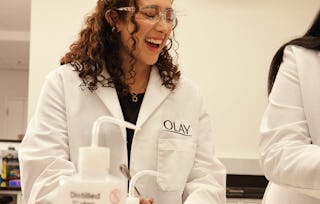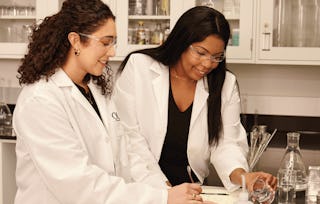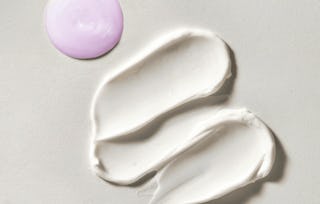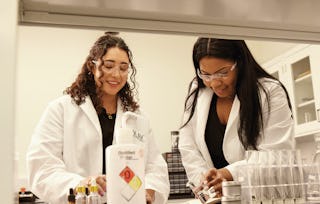This course will introduce students to the variety of scientific careers in the cosmetics and personal care industry and the skills needed to excel in the industry. Covered topics include product ideation, formulation, testing, manufacture, and post-marketing assessment; skin, hair, and nail biology; and claim substantiation. The course also includes a home-based “lab” where students can apply some of the covered concepts.

Rutgers MBS: Introduction to Personal Care Science
3 days left! Gain next-level skills with Coursera Plus for $199 (regularly $399). Save now.

Recommended experience
What you'll learn
Structure of the global personal care industry
Scientific roles in personal care companies
Skills required for success in the personal care industry
Skills you'll gain
Details to know

Add to your LinkedIn profile
26 assignments
See how employees at top companies are mastering in-demand skills

There are 7 modules in this course
In this module, you will be first introduced to the structure of the course. Next, you will look at the structure of the cosmetic companies and the role of entrepreneurship. You will also review major scientific and engineering areas in the personal care industry.
What's included
9 videos16 readings4 assignments1 discussion prompt
In this module, you will be first introduced to how cosmetic products are developed. Next, you will review a product brief’s significance and how to write one. Finally, you will focus on product testing and the multiple areas that encompass it.
What's included
5 videos7 readings4 assignments
In this module, you will first review the cosmetic definition and regulations within the United States. Next, you will review cosmetic regulations found around the world. Finally, you will delve into cosmetic claims and how they are supported.
What's included
5 videos6 readings4 assignments
In this module, you will begin by reviewing cosmetic interactions with skin, hair, and nails. Next, you will examine the ingredient categories, functions, technologies, and formulations within cosmetics.
What's included
6 videos10 readings5 assignments
In this module, you will explore how consumer and clinical testing serve as essential processes in evaluating cosmetic products, directly influencing product claims and consumer satisfaction. Consumer testing involves gathering feedback from target users to gauge preferences and satisfaction levels, whereas clinical testing involves rigorous scientific studies to assess safety and efficacy. Fragrances in cosmetics play a vital role in enhancing product appeal, with selection based on chemistry, compatibility, and desired olfactory characteristics. Sensory and formula tests, along with product label reviews, are conducted according to established guidelines to ensure product quality, regulatory compliance, and transparency. Emulsification techniques are utilized to create creams, involving the blending of water and oil phases to achieve stable, homogeneous mixtures that meet consumer expectations for texture and performance.
What's included
7 videos4 readings4 assignments
In this module, you will understand the sourcing of cosmetic ingredients involves delving into the diverse origins of raw materials, from natural sources like plants and minerals to synthetic compounds produced in laboratories. Exploring pilot plants provides insights into the experimental phases of cosmetic formulation before scaling up to industrial production, highlighting the meticulous process of perfecting formulas. Quality control methodologies in cosmetics encompass rigorous testing procedures, including microbiological assessments and stability tests, ensuring the safety, efficacy, and consistency of products before reaching consumers.
What's included
5 videos11 readings4 assignments
In this module, you will hear from a career panel consisting of Dr. Jay Goldring, Dr. Maria Sousa, and Manessa Lormejuste. This career panel will discuss training, careers, and their passions for the industry.
What's included
2 videos1 assignment
Instructor

Explore more from Chemistry
 Status: Free Trial
Status: Free Trial Status: Free Trial
Status: Free Trial Status: Free Trial
Status: Free Trial Status: Free Trial
Status: Free Trial
Why people choose Coursera for their career

Felipe M.

Jennifer J.

Larry W.

Chaitanya A.
Frequently asked questions
To access the course materials, assignments and to earn a Certificate, you will need to purchase the Certificate experience when you enroll in a course. You can try a Free Trial instead, or apply for Financial Aid. The course may offer 'Full Course, No Certificate' instead. This option lets you see all course materials, submit required assessments, and get a final grade. This also means that you will not be able to purchase a Certificate experience.
When you purchase a Certificate you get access to all course materials, including graded assignments. Upon completing the course, your electronic Certificate will be added to your Accomplishments page - from there, you can print your Certificate or add it to your LinkedIn profile.
Yes. In select learning programs, you can apply for financial aid or a scholarship if you can’t afford the enrollment fee. If fin aid or scholarship is available for your learning program selection, you’ll find a link to apply on the description page.
More questions
Financial aid available,





